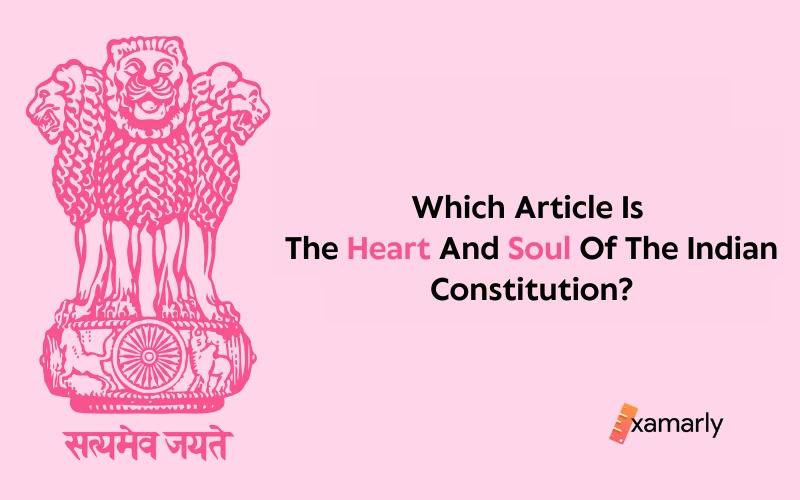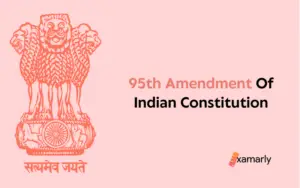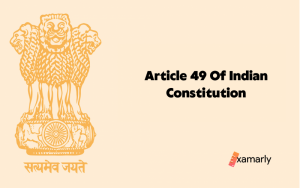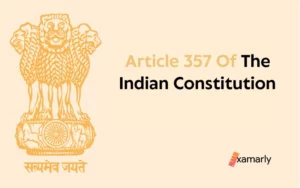Synopsis
Do you know which article is heart and soul of Indian constitution? The Indian Constitution is a document that lays out the fundamental principles and laws of the country. Among its numerous articles, one stands out as particularly important: Article 32.
Dr B.R. Ambedkar believed that the right to constitutional remedies was crucial to the protection of individual rights and the preservation of democracy in India.
In this blog post, we will delve deep into the Indian Constitution and explore article 31 and its important position in the constitution. We will examine its importance, its impact on the society and governance of India and its role in safeguarding individual rights and maintaining the balance of power between the different branches of government. This post will be an informative read for anyone interested in understanding Article 31 and why it is stated as the heart and soul of the Indian Constitution.
- Synopsis
- An Overview Of The Rights And Remedies Provided By Article 32
- The Article 32 – 'The Heart And Soul' Of The Indian Constitution
- Article 32 – Clause As It Is & Explained
- Detailed Analysis Of the Remedies Under Article 32
- What Is The Significant Role Of The Supreme Court Of India Under The Article 32?
- Closing Thoughts
- Frequently Asked Questions
An Overview Of The Rights And Remedies Provided By Article 32
Article 32 of the Indian Constitution is a provision that guarantees the right to move the Supreme Court for the enforcement of the fundamental rights guaranteed by the Constitution. It states that “the right to move the Supreme Court by appropriate proceedings for the enforcement of the rights conferred by this Part is guaranteed.”
This article empowers individuals to approach the Supreme Court directly, in case of violation of their fundamental rights by the state or its agencies, and seek redressal through writs such as habeas corpus, mandamus, prohibition, quo warranto and certiorari. It is considered one of the most powerful articles of the Indian Constitution as it gives the citizens the right to approach the highest court of the land for the protection of their rights.
Significant Aspects Of Article 32
- Article 32 of the Indian Constitution guarantees the right to constitutional remedies for the enforcement of fundamental rights.
- It allows individuals to approach the Supreme Court directly for the enforcement of their fundamental rights in case of violation.
- It serves as a powerful tool for protecting the rights and liberties of individuals.
- It acts as a check on the actions of the government.
- It is considered an integral part of the basic structure of the Indian Constitution and cannot be amended or abrogated by the parliament.
- It also provides the power to the Supreme court to issue writs for the enforcement of fundamental rights.
- Article 32 is referred to as the “Heart and Soul” of the Indian Constitution, as it guarantees the protection of fundamental rights and provides a mechanism for citizens to hold the government accountable.
- It has been used in many landmark judgements in India to uphold the rights of the citizens and hold the government accountable.
The Article 32 – ‘The Heart And Soul’ Of The Indian Constitution
Article 32 of the Indian Constitution is often referred to as the “heart and soul” of the Indian Constitution because it guarantees the right to constitutional remedies for the enforcement of fundamental rights. The provision empowers individuals to approach the Supreme Court directly for the enforcement of their fundamental rights in case of violation. This right is considered to be an essential aspect of a democratic society as it allows citizens to hold the government accountable and ensure that their rights are protected.
In addition, Article 32 gives the power to the Supreme Court to issue writs for the enforcement of fundamental rights, which acts as a powerful tool for protecting the rights and liberties of individuals. The writs like habeas corpus, mandamus, prohibition, quo warranto, and certiorari, provide a mechanism for citizens to challenge the actions of the government and other public bodies if they believe that their rights have been violated.
Furthermore, Article 32 is an integral part of the basic structure of the Indian Constitution and cannot be amended or abrogated by the parliament. This means that it is protected from any changes that may be made to the Constitution in the future, ensuring that the rights of citizens will always be protected.
Given all these reasons, Article 32 is considered the heart and soul of the Indian Constitution, as it guarantees the protection of fundamental rights and provides a mechanism for citizens to hold the government accountable.
Article 32 – Clause As It Is & Explained
Remedies for enforcement of rights conferred by this Part.—(1) The right to move the Supreme Court by appropriate proceedings for the enforcement of the rights conferred by this Part is guaranteed. (2) The Supreme Court shall have the power to issue directions or orders or writs, including writs like habeas corpus, mandamus, prohibition, quo warranto and certiorari, whichever may be appropriate, for the enforcement of any of the rights conferred by this Part. (3) Without prejudice to the powers conferred on the Supreme Court by clauses (1) and (2), Parliament may by law empower any other court to exercise within the local limits of its jurisdiction all or any of the powers exercisable by the Supreme Court under clause (2). (4) The right guaranteed by this article shall not be suspended except as otherwise provided for by this Constitution.
This is a provision from Article 32 of the Indian Constitution which lays out the remedies available for the enforcement of fundamental rights.
- The first part of the provision guarantees the right to move the Supreme Court through appropriate proceedings for the enforcement of the rights conferred by this Part (i.e. Part III of the Indian Constitution which deals with fundamental rights).
- The second part of the provision gives the Supreme Court the power to issue directions, orders or writs for the enforcement of any of the rights conferred by this Part. The writs that can be issued include habeas corpus, mandamus, prohibition, quo warranto and certiorari, whichever may be appropriate.
- The third part of the provision states that without prejudice to the powers of the Supreme Court, Parliament can by law empower any other court to exercise within the local limits of its jurisdiction, all or any of the powers exercisable by the Supreme Court under clause (2).
- The fourth part of the provision states that the right guaranteed by this article (i.e. the right to move the Supreme Court for the enforcement of fundamental rights) shall not be suspended except as otherwise provided for by the Constitution.
This provision is considered an integral part of the basic structure of the Indian Constitution and guarantees the right to seek judicial redressal in case of violation of fundamental rights. It empowers the citizens to move the court in case of violation of their rights by the state.
Subclause Of Article 32 – Article 32(A) – Amendments To Article 32
32(A). [Constitutional validity of State laws not to be considered in proceedings under article 32.].—Omitted by the Constitution (Forty-third Amendment) Act, 1977, s. 3 (w.e.f. 13-4-1978).
Article 32A was an amendment added to the Indian Constitution by the 42nd Constitutional amendment Act in 1976, but was later removed by the 43rd Constitutional amendment Act in 1977.
This article provided that the constitutional validity of any state law will not be considered in proceedings under Article 32 of the Indian Constitution. This means that if an individual wanted to challenge the constitutional validity of a state law, they would have to do so through a separate legal process and not through the process of approaching the Supreme Court under Article 32 for the enforcement of fundamental rights.
This article was added to the Indian Constitution during a time of emergency declared by the Indian government in 1975 and was aimed at limiting the ability of individuals to challenge state laws on the grounds of constitutional validity.
However, the article was later removed by the 43rd Constitutional amendment Act in 1977, after the end of the state of national emergency, as it was seen as limiting the fundamental rights of citizens. With the removal of this Article, the constitutional validity of state laws can be considered in proceedings under Article 32.
Detailed Analysis Of the Remedies Under Article 32
Article 32 of the Indian Constitution is a fundamental right that guarantees the right to constitutional remedies for the enforcement of fundamental rights. It provides that the right to move the Supreme Court by appropriate proceedings for the enforcement of the rights conferred by Part III of the Constitution shall not be suspended except as otherwise provided for by the Constitution.
This means that any person whose fundamental rights have been infringed has the right to approach the Supreme Court for redressal. The remedy under Article 32 is like a writ, which is a court order issued to a person or government agency to enforce a constitutional right. Writs are a powerful tool that allows citizens to challenge the actions of the government and other public authorities and can be used to protect individual rights, such as freedom of speech, equality, and due process.
Types Of Writs Under Article 32:
- Habeas corpus: This writ is used to secure the release of an unlawfully detained person. It can be filed by the person who has been detained, or by someone on their behalf.
- Mandamus: This writ is used to command a government official or public authority to perform their duty. It can be used, for example, to order a government official to issue a passport or to provide a service that is legally required.
- Prohibition: This writ is used to prevent a lower court or government agency from exceeding its jurisdiction. It can be used, for example, to stop a lower court from hearing a case that should be heard by a higher court.
- Certiorari: This writ of certiorari can quash an order or judgment of an inferior court, tribunal or administrative agency on the ground that it is without jurisdiction or that it has failed to follow the principles of natural justice.
- Quo warranto: This writ is used to question the legality of the appointment of any person to a public office or to challenge the right of any person to hold a public office.
The Supreme Court has the power to issue these writs not only for the enforcement of fundamental rights but also for other purposes such as for the enforcement of any other legal right. The writ jurisdiction of the High Court is also defined in the Constitution under article 226, which provides that the High Court shall have the power to issue writs for the enforcement of fundamental rights and any other purpose.
Overall, the constitutional remedy under Article 32 is an important mechanism for protecting individual rights and ensuring that the government and other public authorities act within the limits of the law.
Protection Of Life Under Article 32
Under Article 32, the Supreme Court has been vested with the power to entertain petitions filed for the enforcement of the right to life and personal liberty. If a person’s right to life and personal liberty is violated, they can approach the Supreme Court for redressal by filing a writ petition under Article 32. The Indian Constitution grants the power to the Supreme Court to issue writs such as habeas corpus, mandamus, prohibition, and certiorari, to protect and enforce the right to life and personal liberty of citizens as guaranteed under Article 21, through the provisions of Article 32.
What Is The Significant Role Of The Supreme Court Of India Under The Article 32?
The Supreme Court of India plays a crucial role in enforcing the rights guaranteed under Article 32 of the Indian Constitution. The Supreme Court is the highest in the country and has the power to issue writs for the enforcement of fundamental rights and other legal rights.
The Supreme Court has been vested with the power to entertain petitions filed under Article 32 of the Constitution for the enforcement of fundamental rights. It can be moved by the aggrieved person or by any other person on his behalf. The Supreme Court can also initiate proceedings suo moto (on its own) if it comes to know that the fundamental rights of a person are violated.
Once a petition is filed under Article 32, the Supreme Court has the power to issue a variety of writs, including habeas corpus, mandamus, prohibition, certiorari, and quo warranto, to enforce the fundamental rights of the petitioner. The Court also has the power to grant other reliefs, such as damages, compensation, and interim relief, as may be appropriate in the circumstances of the case.
The Supreme Court also has the power to make binding and authoritative interpretations of the Constitution, including interpreting the scope and meaning of fundamental rights. The Court’s decisions on constitutional matters are final and binding on all other courts in the country, and its judgments and decisions serve as a precedent for future cases.
The Supreme Court also plays an important role in upholding the principle of the rule of law and ensuring that the government and other public authorities act within the limits of the Constitution and the law. It acts as a check on the power of the executive and legislative branches of government and ensures that the rights of citizens are protected against arbitrary or discriminatory actions by the state.
In summary, the role of the Supreme Court under Article 32 of the Indian Constitution is to enforce the fundamental rights of citizens, interpret the Constitution, and ensure that the government and other public authorities act within the limits of the law and the Constitution.
Closing Thoughts
In conclusion, it can be said that the Indian Constitution is a comprehensive document that lays down the fundamental rights and duties of citizens, and the structure and powers of the government. However, if there is one article that can be considered the heart and soul of the Constitution, it is Article 32.
This article guarantees the right to constitutional remedies, which includes the right to move the Supreme Court by appropriate proceedings for the enforcement of the rights conferred by Part III of the Constitution. It serves as a powerful tool for citizens to challenge the actions of the government and other public authorities and protects individual rights, such as freedom of speech, equality, and due process.
The role of the Supreme Court under Article 32 is crucial in ensuring that the government and other public authorities act within the limits of the law and the Constitution, thus making it the backbone of the Indian Constitution.
Read Our Latest Posts
Writ Of Habeas Corpus In India
Difference Between Secularism And Communalism
Article 371 Of The Indian Constitution
Article 291 Of The Indian Constitution
Frequently Asked Questions
What is the most important article of the Indian Constitution?
Many consider Article 32 as the most important article of the Indian Constitution as it guarantees the right to constitutional remedies and serves as a powerful tool for citizens to challenge the actions of the government and other public authorities and protect individual rights.
Explain the right to constitutional remedies under Article 32?
The right to constitutional remedies under Article 32 includes the right to move the Supreme Court by appropriate proceedings for the enforcement of the rights conferred by Part III of the Constitution, which includes fundamental rights.
What are the types of writs that can be sought under Article 32?
Some examples of writs that can be sought under Article 32 include habeas corpus, mandamus, prohibition, certiorari and quo warranto.
What is the role of the Supreme Court under Article 32?
The Constitution of India, in Part III, guarantees certain fundamental rights to citizens. These rights can be enforced in a court of law if there is a violation.
The Indian Constitution grants the power to the Supreme Court and High Court to issue writs under articles 32 and 226 respectively, with the aim of safeguarding the fundamental rights of citizens. These writs serve as a powerful tool for citizens to challenge the actions of the government and other public authorities and ensure that their rights are protected.






